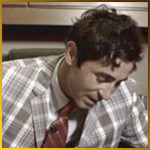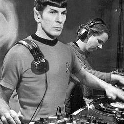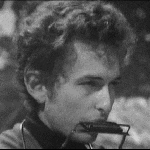|
edit: double post! sorry!
|
|
|
|

|
| # ? Apr 16, 2024 18:50 |
|
dromer posted:Also, I've been looking into non-minimalist modern composers. Does anyone have recommendations? I've been listening to Claude Vivier lately: https://www.youtube.com/watch?v=wzvFJX7mR-4 https://www.youtube.com/watch?v=UK4VL6f9eAg French Canadian spectral composer, was murdered about 30 years ago
|
|
|
|
Back to the first page with you. Like anyone else in our generation, there is more music available to me than I could ever get through. Classical has long been one of things that I'd put a track or two on at a time to feel intellectual, but end up moving on to other things. I've had enough exposure to the big names to know which ones get my attention more than others, but I never really dug in. For that reason, I've started intentionally listening to much, much, much more classical. I've been working through a pretty decent collection and would go so far as to say I've heard more classical music in the past month than 97% of the country will hear in their lives. But that's not really doing it for me, because I feel like I don't know what I'm doing. With pop music, everything is comfortable, I know when the breakdown is coming, and that they're building to an outro chorus, I know they might shift the key up a whole step for a little emphasis at the end, I know what the transition back to the verse is going to sound like before they play it, etc. But with classical music, I feel like a babe in the woods. Right now, I am listening to Dvorak's cello concerto in B minor. And it's a lovely little number with cellos playing the melody supported by some winds. But I don't really know what the gently caress. Sometimes they play a line I recognize from earlier in the piece, sometimes they get louder, sometimes it gets very soft, but I never know what they're playing, when, and why. I can enjoy it as a casual listening, oh that chord sure was pretty, but I want to understand it. Long rambling way of asking, is there a good guide to understanding the way this music is structured, or even analysis of more well know pieces that I could extrapolate to other works? How do I learn more about how to listen to classical music properly, and not just as pretty background music?
|
|
|
|
What is everyone's go to piece when they are in a downright rotten mood, like you're just pissed off at everything? In a more positive note, I've become enamored with the viol (aka viola da gamba). I find it a soothing instrument. I've been going through all different viol players and composers such as Marin Marais, M. de St. Colombe, Fretwork, Jordi Savall.
|
|
|
|
So apparently Beck and a bunch of artists (?) have remixed a bunch of Philip Glass? Anyone hear any of this yet?
|
|
|
|
MC Fruit Stripe posted:Like anyone else in our generation, there is more music available to me than I could ever get through. Classical has long been one of things that I'd put a track or two on at a time to feel intellectual, but end up moving on to other things. I've had enough exposure to the big names to know which ones get my attention more than others, but I never really dug in. First, don't listen to a genre of music just because you think "smart" people listen to it. Listen to music you enjoy. That being said, there was a link a few pages back to a documentary called "How Music Works" that is fairly good at explaining the basics. Also, a few minutes of googling gives me this: http://www.musictheory.net/. Understanding the basics of how to read music notation and what a time signature is really helps in analyzing music. It also helps to note that you're not going to be able to analyze every bit of the music the first time around. Don't worry about hearing everything in one go, and listen to a specific aspect of the music each time, be it a specific set of instruments or how the melody is passed from one instrument to another. Also, typically when I listen to symphonies and the less "iconic" pieces of classical music, I just listen. Doing something else while it's playing just makes the music sound like white noise to me. Finally, picking up an instrument or joining a choir and playing some pieces yourself really helps with understanding how music works. Most people I know appreciate orchestral music because they played an instrument or sung at some point. Having to interpret a piece yourself really helps you understand it. Also, I don't think there's been a link to Valdrez yet. It's one of my favorite marches, and I love the trumpet solo in the second section of the tune: https://www.youtube.com/watch?v=cu2eQ-Y0Q9o
|
|
|
|
I was an indie kid once, then I heard this: https://www.youtube.com/watch?v=M3OTZG0kAFo "Classical" til I die!!!
|
|
|
|
|
Those goddamn chords. Goddamn.
|
|
|
|
|
My goons, please keep the classical thread alive. It's so boss
|
|
|
|
|
MC Fruit Stripe posted:Back to the first page with you. Slightly excessive help: I think it's better to familiarize yourself with classical music by listening to it, really. There are academic analyses of pieces and so on, but beyond what's in the liner notes, or on wikipedia, it's usually more than you're really going to want. The main point is that nobody gets it all the first time, or the fifteenth: that complexity and learning to appreciate it are an integral part of the experience. And you can just enjoy it as sound, too: it's not like it's wrong to do so. Supposedly for a lot of Baroque music that we listen to in concert halls and such, originally half the audience would have been talking over it or eating or asleep or drunk, just like a rock show. Also, if you can recognize a whole-step key change, you already know a fair amount of theory. Most classical music until well into the romantic period is based on simpler (and more rule-based) key changes than rock music: relative minor/major, fifth above, and so on. It sounds more complex because there are complicated rules for how to modulate 'right' and how to get from one supporting chord to another: V must resolve to I, iii almost always is followed by ii or V, etc, and well, because it's polyphony: instead of a melodic line chugging away in one instrument or the vocal line with support from the bass and the drums, as you can here, there are usually multiple lines going on at the same time that are interwoven with each other. You don't really need to get this stuff to enjoy the music, but it might help to know that pretty much everything in classical music from 1200 A.D. until about 1900 A.D. resolves on a V-I cadence. If you want to get a feel for how classical polyphony works, listen to Bach. Pretty much all Bach, even the complicated stuff, is based on very simple four-part chorales like people sing in church. The fancy forms of polyphony in a peice like The Well-Tempered Clavier are based on the same rules of 'voice-leading' as the chorales. The formal ideas in Bach are usually clearly laid out (three part Fugue, four part Fugue, etc etc) and they help in developing an ear. If you want to listen to later classical music with structure and get used to the major forms (theme and variations, sonata form, and so on, all of which are in wikipedia) used in romantic music, you should try Mozart. Mozart usually has very clear delineation of the different themes in the piece and fairly simple key changes. What's going on is not so complicated as in romantic composers who come later. Of course, the best way to learn all the genres and forms in classical music is to listen to lots of music! I can't possibly list all those genres here: I can say one piece that helped get me into classical music when I was younger was Mozart's Requiem, which has a lot of different, contrasting movements, all about five minutes long or so, unified by a clear dramatic and narrative structure (i.e. the ressurection of the dead) and words--it's a bit like a rock album, something that definitely helps in getting through an hour-long piece. Anyway, in the Dvorak you were listening to, there are also going to be fancier key changes based on circles of thirds (C major to E major, etc). But as far as the structure of something like the Dvorak concerto, you've already kind of got it. The first movement of a cello concerto's going to have a relatively free structure, usually with a clearly stated opening theme and some fancy stuff in the middle, followed by a recapitulation at the end (the introduction before the cello entrance in the first movement of the Dvorak's on the long side). I have some classical training, and the main things I can catch listening to the Concerto right now are first theme, second theme, return to the main key, about at that level, nothing really that intricate. To some extent Dvorak is 'program music': the flow of musical ideas are supposed to illustrate changes of emotion, scenery, and so on, instead following a strict form. Now, in something like Wagner, the relationship of keys and themes is very complex and nobody, not even a trained classical musician can hear them all on first listening. It takes repeated hearings and familiarity with the piece, and there are some very complicated things going on: Wagner uses the relationship between themes to foreshadow elements of the plot, illustrate symbolic relationships, (if I'm remembering correctly, the 'Oath' theme is the 'Sword' theme with a chromatic 'break' in it, because there's this whole thing about the 'Sword' being broken, etc.), even this whole metaphysical statement about the universe (the theme for the Rhine is basically just an Eb-major triad, to illustrate the flux that order emerges out of, etc). Obviously, nobody can hear this all the first time. It's something you get partially intuitively, partially intellectually. The point being, don't worry about understanding it all at once. Nobody does. Anyway, there are as many ways of listening to the repertoire as you want. It helps to listen to a range of composers, and a range of genres--I certainly don't recommend sitting down and say, trying to get through all the Beethoven string quartets over a month or something at first, because you'll get bored. Figure out what you like first. One final thing I'd recommend: listen to some contemporary, 20th century music and some early music (medieval, etc) too. With contemporary music you'll generally feel like you know if you hate it, or if it blows your mind, immediately. Early music will either grow on you or just leave you cold. A lot of contemporary music is actually more like rock music, in a way, in that it is about the texture of sound, the feel, as much as it is about structure. One CD which really amazed me ten years ago was called 'Black Angels' and it was put out by a string quartet, the Kronos Quartet.
|
|
|
|
Dr. Video Games 0081 posted:I've been listening to Claude Vivier lately: My boring choice, but, I promise, great music: Bartok. Fourth String Quartet: http://www.youtube.com/watch?v=JWgb-8t43P0 Second Violin Concerto: http://www.youtube.com/watch?v=TryUuUVaHjY
|
|
|
|
oiseaux morts 1994 posted:Those goddamn chords. Goddamn. French composers around 1900 loved power chords. Have you listened to the Debussy preludes?
|
|
|
|
One of the best intro pieces of classical music is definitely Twelve Variations on "Ah vous dirai-je, Maman" Deadly serious. edit: It's great, because you are familiar with the theme, you can then hear him embellish it, play it in a different voice, arrange it differently, then he'll play with the melody slightly, then the phrasing, then by about the 11th variation he's only hinting at the melody. Look up the score while you listen, it' a real thrill. algebra testes fucked around with this message at 17:36 on Oct 6, 2012 |
|
|
|
Slightly different classical music post. So, Pt. Ravi Shankar is very old and very ill. He recently had to cancel his upcoming American performances and I've been told through the grapevine that he is currently on oxygen 2nd to a heart disease that he has struggled with since his 40's or so. He is reportedly not doing well. Once he passes we'll lose one of the eminent instrumentalists of that generation, and a giant in the world of Indian Classical Music. There'll be a handful of vocalists left from that generation, but not many. https://www.youtube.com/watch?v=iqUwnUTjwHU Here is a jugalbandi/duet with Ravi Shankar and his guru brother Ali Akbar Khan. Bilashkhani Todi is supposed to depict a sad, somber mood. The legend behind it is that when Miyan Tansen (a historic and legendary figure in ICM) passed away (c. 1589) his son Bilash Khan was supposed to sing at his funeral. He had planned to sing Tansen's famous raag Miyan Ki Todi, but in his grief made a mistake and created Bilashkhani Todi. I've been studying this raag recently, and the news of Raviji has definitely cast a pall on the air. If you're less familiar to help orient yourself, the notes of this raag are C#, D, E, G#, A, C# on the ascent, D, B, A, F#, E, D on the descent. Alap goes from 0:00 - 9:20 Jor from 9:20 - 14:08 Jhala from 14:08 - 15:20 Upaj Tans for the remainder of the track. Spare a thought for Raviji at some point today. Yiggy fucked around with this message at 05:13 on Oct 10, 2012 |
|
|
|
This isn't necessarily a classical question, but more of an orchestral music question, since I'm not sure if the kind of piece I'm looking for is to be found in classical classical. I'm trying to find some sort of marching music with a steady cadence. I've listened to a variety of marches, but every single one seems to be much more elaborate, major-key, and bright and happy and toodly, which is exactly the opposite of what I'm looking for. I want to find a dark, violent classical/orchestral piece that sounds like some sort of military force could actually march to it. I'm a big fan of Holst's Mars, and it feels like it's sort of related to what I'm looking for, but I don't know where to continue my search.
|
|
|
|
atomicthumbs posted:I'm trying to find some sort of marching music with a steady cadence. I've listened to a variety of marches, but every single one seems to be much more elaborate, major-key, and bright and happy and toodly, which is exactly the opposite of what I'm looking for. I want to find a dark, violent classical/orchestral piece that sounds like some sort of military force could actually march to it. How is this? I always felt it had a dark, steady cadence. https://www.youtube.com/watch?v=Z_hOR50u7ek
|
|
|
|
Hey, I'm looking for some help getting into classical music. For many years, I have listened to it on public radio, Pandora, Last.fm, whatever -- and I have enjoyed it immensely -- but I am literally undiscerning. As in, I cannot recognize a piece or know if I have heard it before, I have no sense of time periods, regions, composers, styles, forms, etc. So what I'm looking for is a widely-varied "starter list" (or multiple starter lists), recommended samplings of many places and times so I can start to get an idea of what I like and what I'm hearing! The other day I was listening to the radio and they played Bach's Violin Concerto #1, and it was the first time I ever listened to a piece of classical music as a unique object: i.e., "This is Bach's Violin Concerto #1, which is not any other piece of music in the world but itself." That is something I would like to add to. So I'm humbly asking for help. Thanks in any case!
|
|
|
|
nomadologique posted:Hey, I'm looking for some help getting into classical music. It's maybe too much and too broad, but you could look at the Norton Recorded Anthology of Western Music. College level music history classes usually use it. It is a bit academic but truly comprehensive. It's a set of box sets in three volumes and expensive as hell, BUT the track listing is free and publicly available, and probably everything on it is on youtube. I'm not suggesting you try to listen to everything, but it's a place to start with. The allmusic listing also has short ten-second samples which play in sequence, which can help give a sense, since you'll end up focusing in on something you like anyway. Here are the url's: note that the track listing is divided up into minute-long chunks within each piece (I guess so people can cue excerpts for classes) and there aren't quite as many pieces as first appears. It also looks pointlessly intimidating. But it's good. http://www.allmusic.com/album/norton-recorded-anthology-of-western-music-vol-1-ancient-to-baroque-box-set-mw0001407742 (this is Ancient Greece (!) up to Bach. most people consider this really overemphasized in the norton anthology, but it's easy enough to skip.) http://www.allmusic.com/album/norton-recorded-anthology-of-western-music-vol-2-classic-to-twentieth-century-box-set-mw0001869809 (this is 'classical music proper,' namely 1750 up to 1900. it's probably what you're thinking of.) http://www.allmusic.com/album/norton-recorded-anthology-of-western-music-vol-3-twentieth-century-mw0001410138 (twentieth century, including Debussy, Stravinsky, Bartok, etc. Very biased towards American composers, but still not at all bad.) Since this is still a lot of stuff, I'd recommend starting with volume 2. I'm guessing it takes maybe an hour to listen through each set of excerpts. EDIT: I'm looking at the twentieth-century volume and it's great now--it used to be awful. It's still a little over-heavy on Americans, but whatever. Roadside_Picnic fucked around with this message at 09:11 on Oct 13, 2012 |
|
|
|
nomadologique posted:Hey, I'm looking for some help getting into classical music. Google can probably help you out easier than any of us can. Something like this? http://www.classicalcdguide.com/ In any case, here's a second piece of music that you (and the thread) can listen to as a unique object. John Adams - Harmonielehre https://www.youtube.com/watch?v=nFj9NSh6x90 https://www.youtube.com/watch?v=fGnYwiZLiWQ https://www.youtube.com/watch?v=-9k_eTPbOiY It's basically what would happen if romanticism and minimalism were ever to hook up while tripping.
|
|
|
|
How do people feel about Arvo Part? He kind of gets dumped on a lot but I have to admit I really like his music. The Seven Maginficat-Antiphons has some very cool stuff in it (ignore the creepy MYSTICAL ANIMATED JPG FIRE visuals on the video below: it's a good recording) http://www.youtube.com/watch?v=t4wwGWPWeeo&feature=autoplay&list=PLE08D2D5F3887E9B2&playnext=1
|
|
|
|
I've been on a string quartet kick lately. Beethoven Op. 133 "Grosse Fugue" http://www.youtube.com/watch?v=xjUh11EPGcM Smetana, String Quartet No. 1 "From My Life" http://www.youtube.com/watch?v=tnZDQOcF8pM Vaughan Williams, String Quartet in C Minor (No. 2?) http://www.youtube.com/watch?v=7rfmgF0Ga30 I have the complete quartets of Bartok and Shostakovich but I'm lost. I adore Bartok's 'Music for Strings, Percussion and Celesta' and Shostakovich's violin concerto. Anyone have favorites? I think Bartok 4 was mentioned earlier on the thread so I plan to give that a listen.
|
|
|
|
sina posted:
You should listen to all the Bartok Quartets since it's only like 2 hours of music. #3 is the shortest so start with that one. My fave Shostakovich is #3, people always talk about 8 but I think it's kinda boring. All the Shostakovich quartets are pretty consistently quality tho (unlike his symphonies), you should take the time to listen to 'em all! One of my favorite quartet cycles is by Schumann. He only wrote 3, and published them all together (opus 41?), so it's not really a significant part of his output, but they're really nice. I like the first one the best: http://www.youtube.com/watch?v=8YVAh3_rr1Q
|
|
|
|
sina posted:I've been on a string quartet kick lately. I didn't know the Vaughan Williams String Quartet: this is cool! The Shostakovich 8th string quartet is probably the most famous one, for a good reason. I don't know if the music he wrote for Battleship Potemkin exists as a separate suite (it's mostly stuff from one of the symphonies, I forget which one) but if it does, I'd snap it up. Also, the 14th Beethoven string quartet. Roadside_Picnic fucked around with this message at 06:56 on Oct 23, 2012 |
|
|
|
Roadside_Picnic posted:How do people feel about Arvo Part? He kind of gets dumped on a lot but I have to admit I really like his music. The Seven Maginficat-Antiphons has some very cool stuff in it (ignore the creepy MYSTICAL ANIMATED JPG FIRE visuals on the video below: it's a good recording) Hooray, Arvo Pärt! His choral works are utter hell to sing, but worth the effort. It all feels so counter-intuitive, and even as an experienced singer you need to spend some time figuratively putting your hands over your ears and concentrating on your own part before getting a feel for the sound as a whole. I came here to recommend Debussy's Sarabande, a beautiful lush piece of piano music I've been listening to a lot recently: http://www.youtube.com/watch?v=JaTTd8fQVCA. Party Spock fucked around with this message at 12:28 on Oct 23, 2012 |
|
|
|
Thanks goons! I'll start with Bartok 3/4 and Shostakovich 8. I'd give the complete cycles a listen but it would just end up being background music after a point so I wanted something to focus on first. I actually found some info on the Shostakovich quartets http://www.quartets.de/index.html that others might find interesting. I know very little about Shostakovich so this was helpful. Roadside_Picnic: AFAIK Vaughan-Williams wrote 2 string quartets. I'm only just now discovering his music (thanks thread!) and love what I've heard so far. To contribute: Barber String Quarter Op. 11, third mvmt http://www.youtube.com/watch?v=tKldmP4l8Es&feature=related This is the work the famous Adagio comes from. It sounds quite different with just 4 instruments, and the rest of the work is fantastic too thus linking one of the 'uncommon' movements.
|
|
|
|
JediGandalf posted:What is everyone's go to piece when they are in a downright rotten mood, like you're just pissed off at everything? All depends. If I'm bummed out and wish to stay melancholy, the Andante movement from Mozart's 23rd piano concerto. https://www.youtube.com/watch?v=53zwHYwr6BI In general, I'm more into opera than strictly instrumentals, so a vocal equivalent would be Ah, non Credea, either by Maria Callas https://www.youtube.com/watch?v=pdCk03Yhw40 or Anna Moffo https://www.youtube.com/watch?v=XuC25v_tzOA (incidentally, that last vid might be my favorite on youtube. The stylized, stagey acting, the fullbright lighting, the slightly overcranked feel, just really lends it a dreamy ambience that suits the piece (which is sung while "sleepwalking") perfectly.) If I need something to calm me and give me peace, nothing better than Offenbach's Barcarola https://www.youtube.com/watch?v=sQR0LQskL4E unless it's Delibes flower duet https://www.youtube.com/watch?v=uNBKfNo9Pu0 Surely two of the most beautiful pieces ever written. if I'm pissed and want to stay pissed or want something to reflect my mood, it's an easy choice: https://www.youtube.com/watch?v=JzFi-7H9TKs&t=122s e: just noticed that all the pieces I picked are sung by women. Dunno why it worked out that way, just like the soprano voice best I guess. regulargonzalez fucked around with this message at 04:26 on Oct 24, 2012 |
|
|
|
Was going to effort post this, but will make it short: Any fans of Iannis Xenakis out there? I think he's amazing. Here's Rohan De Saram playing a solo cello piece, Kottos: http://www.youtube.com/watch?v=lKDIQSyR4G0 Also, here's an early computer music piece, 'Mycenae Alpha,' partly famous for its really pretty graphic score (which is not totally beside the point-Xenakis was also an architect) http://www.youtube.com/watch?v=yztoaNakKok I've also been trying to get into Giancinto Scelsi but haven't really got it yet. Roadside_Picnic fucked around with this message at 07:15 on Oct 25, 2012 |
|
|
|
dromer posted:First, don't listen to a genre of music just because you think "smart" people listen to it. Listen to music you enjoy. I like your idea of listing to one part at a time. I've studied enough music theory and listened intently to enough non-classical music that I can pick out instruments at will, and I've had a lot of luck with classical music just picking out what the horns are doing, or the bass, etc. I'm not sure if I have an advantage with being able to pick out parts but I definitely feel like it helps me understand a piece better. Roadside_Picnic posted:Slightly excessive help: There is too much in your post to go through point by point and address, but I think you were able to take the hints I was dropping when I talked about understand music to know that I have a firm grasp of theory. It's the structures of a lot of classical music that throw me off, and why sometimes I have trouble with figuring out where we are in a piece. Like I said, in popular music, I know verse, chorus, verse. In jazz, I know head, solo, head. But in classical, this is new territory for me. I am getting a firm grasp of what I like. You said Bach would be a good place to start. I loving love Bach. I am not as wild about Mozart, but I dig the poo poo out of Tchaikovsky and Brahms. I don't fully understand enough about the music to know why I like Bach, Tchaikovsky and Brahms, what if anything they have in common, and what that means for me, but I'm at least recognizing things that I like and don't like. And speaking of don't like, can I just say that whether I understand every bit of structure or not, I simply can not freakin stand Anton Webern? I am trying to make it through Boulez's "complete" works, and man this is not going well at all. And yeah, I understand what he's doing, and yeah, I've listened to some loving weird poo poo, but this does not do a thing for me. I can't wait to delete this album. (e: strike that, I will listen to this album 3 times before deleting it. I believe in you, Webern, you can do it!) Worth nothing, I thought Schoenberg was alright-to-good, so it's not a "modern music" thing, I just do.not.like.this. MC Fruit Stripe fucked around with this message at 01:54 on Nov 1, 2012 |
|
|
|
MC Fruit Stripe posted:And speaking of don't like, can I just say that whether I understand every bit of structure or not, I simply can not freakin stand Anton Webern? I am trying to make it through Boulez's "complete" works, and man this is not going well at all. And yeah, I understand what he's doing, and yeah, I've listened to some loving weird poo poo, but this does not do a thing for me. I can't wait to delete this album. (e: strike that, I will listen to this album 3 times before deleting it. I believe in you, Webern, you can do it!) Re: Form http://home.earthlink.net/~dbratman/sonata.html That'll get you into the basics of Symphonic form (Very basics). Yet again, I studied this poo poo and I don't remember half of it but the gist of it is there is no "Verse Chorus Verse" structure because each different piece of classical music could adhere to a different form. Anyway, quick and dirty example: First movement of Beethoven's fifth. Sonata-Allegro Form because that's what the first movement of a symphony (almost) always is. Exposition - First Theme - DUNUNUN-NAAAAAA - Second Theme - the soft stringy part where the melody goes strings - woods - strings. We then repeat both. Development - Quite clearly he goofs around on the first theme for a while. It sounds like we're doing the first theme again, but he's actually developing the themes, quite literally. - I always quite literally mess my pants during this part so good. Technically the "retransition" is the spot he does a very dramatic "DUNUNUN NAAAAAAAA!!!!" and you go "oh poo poo, poo poo's going down" Recapitulation - We do the first theme, and we goof around on it, but it is quite clearly the first theme, not a variation on the first theme. - Oh hey, we do the second theme, and we goof around on that. Coda - Conceptually the bit between the second theme, and the very very end of the song. Sort of the "outro" if you will. You might even find them goofing around on one of the themes at this point also. edit: for more on the overall structure, wikipedia is helpful. http://en.wikipedia.org/wiki/Symphony_No._5_(Beethoven)
|
|
|
|
Boy this was the finest episode of Pipedreams I have heard in a long time: http://pipedreams.publicradio.org/listings/2012/1238/ Back from the BBC proms. Cameron Carpenter playing some reworked Bach pieces and while I usually enjoy a straight interpretation these are fantastic.
|
|
|
|
Although a contemporary of Chopin and Liszt, Charles Valentin-Alkan's piano works are less widely known mostly because of their spectacular difficulty and partly because he himself was a reclusive sort who was not popular in his day. Alkan was an eccentric guy who Liszt famously (and unironically) remarked "had the best technique he had ever seen." He did not remark on Alkan's compositions however. Nevertheless the two (three, with Chopin) co-existed and were well aware of each other's music. For example, Alkan's Grand Sonata has similarities with Liszt's B Minor Sonata in that both invoke themes from the myth of Faust. Alkan's music is less significant compositionally than Chopin or Liszt, however I feel that his music is also probably underrated and under appreciated because of the lack of any proper interpretations. Alkan himself is to blame for the difficulty of his music, but thanks to the work of the pianist Marc Andre-Hamelin and his ludicrous technique, his works are finally revealed to us the way they should sound. And because of this I think one is forced to concede that there is a great deal of musical worth in Alkan's compositions. In his Grand Sonata, he depicts the four ages of a man, at 20 years (young man), 30 years (Faust), 40 years (happily married man), and 50 years old (old man marching to death). In the middle of the second movement (30ans), there is a brief 8-voice romantic fugue. Alkan's Grand Sonata 'Les Quatres Ages' (The Four Ages), perf. Marc Andre-Hamelin https://www.youtube.com/watch?v=MRFGIUN2MLA&feature=results_main&playnext=1&list=PL2F636FDFC627382B In this Concerto for Solo Piano, Alkan takes 3 etudes from his cycle of etudes in minor keys and creates a work of staggering breadth. With Tutti, Piano, and Solo sections, the pianist attempts to replicate the sound world of an entire orchestra for nearly 1 hour of music. Alkan's Concerto for Solo Piano, perf. Marc Andre-Hamelin https://www.youtube.com/watch?v=7TBAouelk8U&playnext=1&list=PLE82B1B66AA12309D&feature=results_main My opinion: Although technically astounding, thematically the music feels quaintly innocent, naive, maybe even immature. You might say Alkan had a child-like musical soul. They also have this intense, almost manic-depressive joyful exuberance followed by brooding depression. I don't see this as purely negative however - to me his music feels like simplicity and loveliness cloaked in layers of melodic octaves and seventh chords. edit: I should also warn that it is very easy when listening to Hamelin playing Alkan (and lots of other things) to get so blown away by the hyper-virtuosity of Hamelin (unlike anything you have heard or ever will here) that it's very hard to get past that and evaluate the music. That's why I made this post close to a year after discovering this particular music. To anyone who hasn't listened yet, the virtuosity certainly makes this music thrilling to listen to. CowOnCrack fucked around with this message at 06:02 on Nov 5, 2012 |
|
|
|
I have to correct my earlier post regarding Vaughan Williams string quartets. Plus I like this thread and want to see it back up towards the top... Anyway, Vaughan Williams wrote *three* string quartets. The one I posted (c minor) is from 1898 and is not numbered because basically, he decided he didn't like it. (From memory, I think I found reference to him essentially disavowing it? Don't quote me on that!) String Quartet No. 1 is in g minor, and dates to 1908 (He took lessons with Ravel around this time). Here is the first movement! http://www.youtube.com/watch?v=ohXqeizCQy0&feature=relmfu String Quartet No. 2 is in a minor, and was completed in 1944. It bears the dedication "To Jean on her birthday" as it was written for violist Jean Stewart. It is utterly fantastic. I like to read along with the score while listening when I can, but unfortunately I can't find a copy of the score to this. (Out of print, still under copyright) Here is the first movement: http://www.youtube.com/watch?v=7Pg3Hd55_w4&feature=relmfu Enjoy!
|
|
|
|
And now, for something probably a little different: https://www.youtube.com/watch?v=HHUMT9EvVbo What kind of music starts at 6:30 into this video? It feels very tango or latin to me. Where do I go to find out more? I have been listening to an enormous amount of Piazzolla, if that shows you where my tastes are.
|
|
|
|
Can anyone recommend a particular recording of Monteverdi's complete madrigals?
|
|
|
|
Goons, I need help finding a good Classical internet radio station that is free of advertisements. Doesn't matter if its free or paid, although free is preferred I'll pay to get rid of ads.
|
|
|
|
Kjermzs posted:Goons, I need help finding a good Classical internet radio station that is free of advertisements. Doesn't matter if its free or paid, although free is preferred I'll pay to get rid of ads. Try http://music.cbc.ca/ Choose the classical tab on the right side. 10 varied streams. Unfortunately, they tend to stick to a certain rotation for a while, but it's easy to find something interesting. There are occasionally short little plugs for various features of the cbc music site, but they don't last more than 15-20 seconds. Mahler fucked around with this message at 06:49 on Nov 13, 2012 |
|
|
|
Jinnigan posted:
Loved the video  It does sound like Argentine tango to me. If you want to know more about the music itself, there are a lot of good articles that Google will pull up "Argentine tango history". (Yes, lame answer, sorry, wasn't sure if you wanted more music of that style or wanted to know more -about- it) You've been listening to Piazzolla. I adore his music! I won't post links for everything but highlights include: Libertango, Four Seasons of Buenos Aires, Milonga del Angel, Muerte del Angel, Vuelvo Al Sur, Adios Nonino, Tango Suite, Histoire du Tango. Couple of links for versions I especially like: First movement of Tango Suite, performed by the Assad brothers (for whom it was written) http://www.youtube.com/watch?v=Cx2DFrMc6KU Adios Nonino, scored for bandoneon and strings, Piazzolla performing http://www.youtube.com/watch?v=VTPec8z5vdY&feature=fvwrel Muerte del Angel, Quinteto Tango Nuevo (Piazzolla's quintet) http://www.youtube.com/watch?v=YXpSL20IvRM Other tango music you may like: El Chamuyo http://www.youtube.com/watch?v=7jzsWKLIy2M La Cumparsita http://www.youtube.com/watch?v=6yoLXINtBwE&list=PLCDAB41CC9C8ADCA2&index=1 (instrumental) http://www.youtube.com/watch?v=P0LosvoEEy8 (tango cancion as sung by Carlos Gardel) Por una cabeza (you WILL recognize this) http://www.youtube.com/watch?v=BHunor1B3xU (instrumental) http://www.youtube.com/watch?v=8dStp5hq294&list=AL94UKMTqg-9B5U9ygLxJWw2RrewjTFak8&index=1 (tango cancion, Carlos Gardel singing) El Choclo http://www.youtube.com/watch?v=Kw8u7XXiHs4&feature=related And not tango but still great that you might also enjoy, Manuel de Falla's Miller's Dance from "Three Cornered Hat" (skip to 3:12) http://www.youtube.com/watch?v=xlc08h1mbLo
|
|
|
|
Are there any early music specialists on here? I found this video while learning about the "organistrum". https://www.youtube.com/watch?v=oRIF_undL8Q Does anybody know, what the name of the piece he's playing is? Or anything similar? I like the sound of choralesque music played only with one hand. It could be, that it's a reduction of a more polyphoneous piece, but in that case I would like to know where to start looking for reduced music like that. Case271 fucked around with this message at 09:11 on Nov 14, 2012 |
|
|
|
zenguitarman posted:So apparently Beck and a bunch of artists (?) have remixed a bunch of Philip Glass? Anyone hear any of this yet? No but his version of Aphex Twin's Icct Hedral is worth a link. https://www.youtube.com/watch?v=9fwjZFLmrpE
|
|
|
|

|
| # ? Apr 16, 2024 18:50 |
|
dromer posted:Does anyone have recommendations for good brass pieces to listen to? While I love listening to symphonies and piano pieces, too much of the same timbre tends to make me zone out. I can answer both questions with one guy (albeit a bit late). Dan Schnyder. Horn player named Adam Unsworth released an album called "Just Follow Instructions" (available on Spotify/Itunes/etc) which is various music by Schnyder either re-arranged for just brass (as opposed to brass + soprano sax) or originally written for brass. It is amazing. Spotify Link: http://open.spotify.com/album/4ULYBDDWKWPJiKVwEUa06y I'll also second the recommendation of Eric Ewazen's ouvre.
|
|
|






























